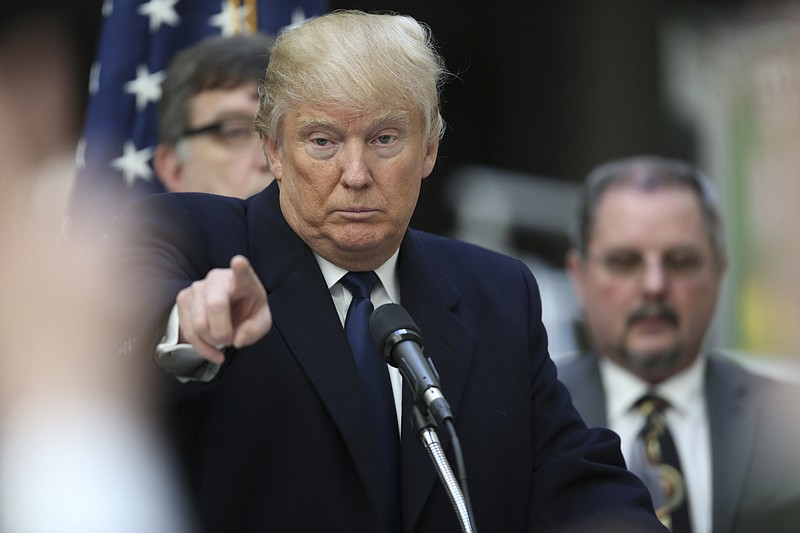Who was that masked man?
"We're going to seek a truly inclusive society. We condemn bigotry and prejudice in all of its forms. We denounce all of the hatred, and we forcefully reject the language of exclusion and separation. We're going to come together. We have no choice. We have to - and it's better."
No, that's not a quote from Dr. Martin Luther King Jr. or even Barack Obama. It actually was from Donald Trump on Thursday night in Ohio during his "Thank you" tour.
And it was a good sound. And a fine beginning for a speech that went south once he got warmed up and fell back a bit into his divisive self, railing against the "dishonest" press and his fellow Republicans whom he believes didn't show him the support he deserved.
Of course, he also played the Clinton Card: "We had fun fighting Hillary, didn't we?" he prodded. Then he paused a bit, waiting for the crowd to begin chanting "Lock her up." Right on cue, they started.
Trump smiled, shook his head - and then did something else a bit presidential.
He didn't respond. Instead, he pivoted.
He reveled in the size of crowd with people "still pouring in" and jobs that Carrier is keeping in Indiana thanks to vice president-elect (and Indiana Gov.) Mike Pence giving $7 million in tax breaks to the company as an enticement to keep the plant open and keep almost half of the workers there employed.
Trump pivoted and took the high road. Baby steps are good, and we'll give credit where credit is due.
Seatbelts for buses: What a concept
The latest discussion in changing Tennessee state law to require seatbelts on school buses comes nearly two years after our lawmakers considered such a bill, but just days after the fatal Woodmore Elementary School bus crash that took the lives of six children.
Two years ago, the legislation was introduced by then-Rep. Joe Armstrong, D-Knoxville, in January 2015 - just a month after a fatal bus crash in Knoxville killed two students and an adult aide.
Armstrong's bill, which did not call for retrofitting buses but would require new buses to have seatbelts, failed to garner enough support. It would have increased state and local expenditures by $5.5 million and $33.1 million, respectively, according to a fiscal note.
Following the tragedy here and Gov. Bill Haslam's call to revisit the issue, Chattanooga's Rep. Gerald McCormick told reporters: "I think there's no excuse that we haven't done this a long time ago, and all we can do now is try to make up for lost time as best we can."
McCormick has begun drafting legislation to retrofit buses, and he said lawmakers in the Hamilton County delegation were sharing their thoughts with one another via text message when he informed them about his plans.
"I think just about every one of them has replied that certainly they're on board and want to be helpful," McCormick said.
Good work, sir.
Trump has good place to start
Although Donald Trump has called the American economy a "disaster" and boasted he'll "make America great again," he'll be inheriting quite a good American economy when he takes office in January.
According to the newest report from the Department of Labor, Trump can expect to inherit an economy that has added private sector jobs for 80 months, put another 178,000 people on payrolls last month and pushed the unemployment rate down to 4.6 percent today from 4.9 percent the previous month. Wage growth, though slower, is still running ahead of inflation, and consumers are expressing the highest levels of confidence in nearly a decade.
Conversely, when Barack Obama was waiting to take office after the 2008 presidential election, the economy was in a free fall: Employers reported cutting 533,000 jobs that November, the biggest monthly loss in a generation.
Ironically, for all the improvements since, tens of millions of Americans understandably feel that the recovery has passed them by as employers sat on wages and trimmed for efficiency and higher profit. Workers without skills were relegated to low-paying positions without steady schedules, security and benefits. Breadwinners who once held well-compensated manufacturing jobs became angry about being forced to settle for lower-wage service jobs - or no jobs at all. Their anxiety about the ability to reach or comfortably remain in the middle class helped propel Trump to the White House.
Now Trump's challenge will be in keeping it going and getting the benefits of that improved economy down to the workers.
